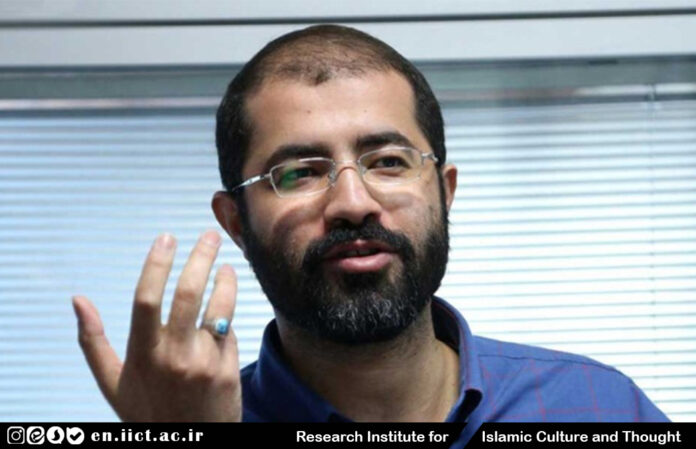“Bi’that” means to be chosen, that is why we say that Prophet Muhammad (pbuh) was sent as a prophet. Mab’ath, is the day Prophet Mohammad (pbuh) was chosen to be the prophet of the people in Mecca on 27 Rajab, 13 years before Hijra (when the Prophet (pbuh) was in Mecca and had not yet gone to Medina). Prophet Muhammad (pbuh) was the last prophet chosen by God and no other prophet came after him. When Prophet Muhammad (PBUH) was chosen as a prophet, he was forty years old and was living in the city of Mecca .
According to the public relations report of the Research Institute for Islamic Culture and Thought, Shabestan news agency had a conversation with ” Mahdi Jamshidi” member of the academic faculty of the cultural research department of the Institute, as you will read below.
What factors made the prophethood necessary?
The Prophet is looking for an “inner revolution”; He wants to create a “holy event” inside man and reborn man. He knows that there is a distance between the “existence” and “true essence” of man, and a human being is naturally only human in terms of existence, but since his nature is selective and can be chosen freely, he must take a step on the path of “becoming human” and realize “humanity” within himself. The Prophet wants to help man in crossing this distance and grant him divine nature and essence. Without the Prophet, mankind is unable to proceed. It is this deficiency and incapacity that caused the “necessity of prophethood” and denied the sufficiency of reasoning and intellect alone.
What was the main issue and concern of the Prophet in guiding the society? To what extent did the Prophet of Islam try to realize public culture in the society of his time?
The concern of the prophet should not be limited to the spiritual life of man, it shouldn’t be imagined that the inner need of man is the end point of the prophetic responsibility. The Prophet wants to sanctify the “cultural order of the society” and turn the “structure of the society” into a favorable platform and atmosphere for the spiritual evolution of man. The Prophet knows that the spiritual life of a person is strongly connected to what is happening in the society, and the conditions of the society are the elements that shape and guide mankind. Therefore, he cannot be indifferent and unconcerned about the situation of the society. So, he openly and decisively tries to transform the “social system” within the framework of his prophetic goals. If the social system and its structures, including the cultural structure, assumes a holy spirit, and religious values dominate it, then the spiritual necessity of mankind towards heavenly and high goals will be greatly facilitated, and man will have more speed and possibilities on the way to get closer to God. The Prophet does not want the scope of his call to be limited and narrowed down and guide people individually and one by one, rather he wants to recreate the social system in such a way that “structural capabilities” serve the spiritual perfection of man .
How has Iran’s Islamic Revolution been able to be inspired from prophethood and what has it done for the spiritual life of humans?
” Islamic Revolution of Iran” is in line with the Prophet’s call and aims to create a new world and human, connected to the divine realms. The Iranian revolution has its roots in such a philosophy and is not just about material concerns. This revolution is the continuation of the same historical movement that the divine prophets followed during the process of “divine socialization” and tried to provide greater possibilities for human development through “structural transformation” in the layer of the social system. Just as the Prophet saw the inner life of man reflecting in the mirror of “structural transformation” and did not have a small and limited vision of his mission, the Islamic revolution also aims to make spirituality flow on a structural level and to get the social system to serve divine goals. This revolution, just like the Prophet’s revolution, also seeks to organize the material life and livelihood of man, but it considers spiritual and moral life as superior side, and introduces the meaning as the original thing compared to the material .
Therefore, the spiritual concern of the revolution is not to impose religion and servanthood on the people, and the revolution does not aim to impose its own will on the people, but the goal is that the public arena and official structures do not have a different direction and goal from the spiritual movement of mankind, so that they do not invite people to ignorance and rebellion. Such a necessity arose from the revolution itself, which promised a holy utopia and mobilized the society in the direction of establishing systems that facilitate the service and servanthood of the Almighty God. If the spirituality was to be left and delegated to the individuals and the public arena was to be “secular” and “neutral”, then achieving “political power” would have no meaning and the Prophet would have to be content with calling, preaching and advising. He had to leave the rest of the way only to the individual’s own choices, but he put “holy systematization” in his agenda to make “community building” as a favorable environment, for making “self building” possible .




